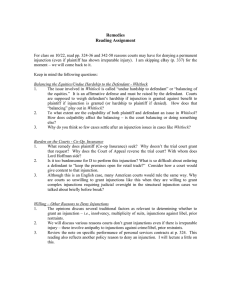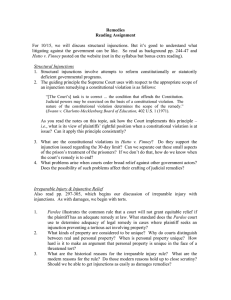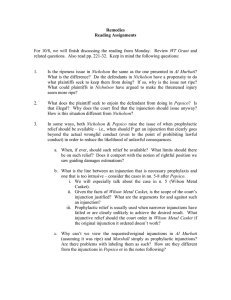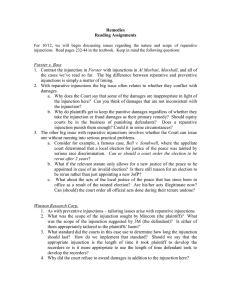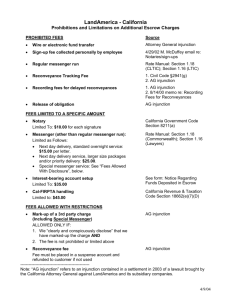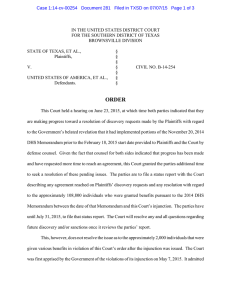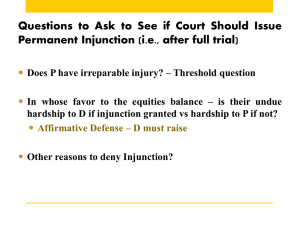BEYOND IRREPARABLE INJURY - Balancing the
advertisement
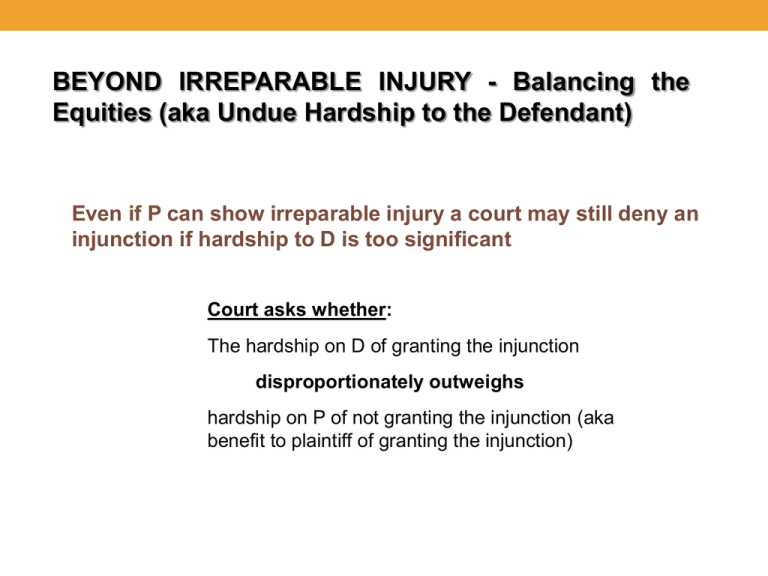
BEYOND IRREPARABLE INJURY - Balancing the Equities (aka Undue Hardship to the Defendant) Even if P can show irreparable injury a court may still deny an injunction if hardship to D is too significant Court asks whether: The hardship on D of granting the injunction disproportionately outweighs hardship on P of not granting the injunction (aka benefit to plaintiff of granting the injunction) Balancing of Equities/Undue Hardship, cont’d • This is a defense = must be raised by D or it’s waived. • How do we give content to this test? • What kinds of harm to P if injunction is not granted (or what benefit to P if it is granted) does court weigh in the balance? • What kinds of harm to D if injunction granted does court typically weigh in the balance? Balancing the Equities in Whitlock • Does the burden on D (Hilander) if the injunction is granted disproportionately outweigh burden on P (Whitlock) if injunction is not granted (or benefit if granted)? • What is harm to D if granted? • What is harm to P if not granted? • Why doesn’t appellate court uphold lower court’s REFUSAL to grant injunction? To what extent should D’s culpability factor into the court’s balancing of equities? • How should courts deal with D’s culpability during the balancing? • Should it matter that D acted intentionally if D’s harm from granting the injunction is disproportionate to P’s harm? • What outcome in Whitlock if D didn’t know the addition was over the property boundary but also didn’t bother to check? To what extent does P’s culpability weigh in the balancing? • If P does something to aggravate the situation, courts can weigh P’s actions in the balance as well. • Example – if P refused to allow surveyors on land to find out where lot lines between P & D’s land were • To what extent is D arguing P (Whitlock) has acted in a manner so as to be undeserving of relief? • P’s claim is barred by laches • • • The Doctrine of Laches: Equity aids the vigilant, not those who sleep on their rights. Courts deny relief if • P’s neglect to assert a right or claim • Together with the passage of time or other circumstances • Substantially prejudices D Do P’s actions fit this definition? Cooperative Insurance – Still More Reasons to Deny Injunctions Once P has established irreparable injury as a result of D’s actions, a court may still deny P’s request for an injunction for many reasons OTHER than balancing of the equities (these are often described simply as part of a court’s “equitable discretion”). What remedy does Co-op Ins. P seek? Why does the trial court refuse to grant P’s requested remedy? Cooperative Insurance – Balancing the Equities (a review) In whose favor do the equities balance? Who has the greater burden if the injunction is or is not granted? ◦ P’s burden if not granted? ◦ D’s burden if granted? Disproportionate to P’s? ◦ Wasn’t D an intentional actor (i.e., didn’t breach Why does that weigh differently than in Whitlock? intentionally)? Cooperative Insurance – Enforcing Clause 4(19) & Burden on the Court Why is it so burdensome for the court to order D to “keep the premises open for retail trade?” What is likely to happen if the parties can’t agree as to the meaning of the term or on how to interpret the court’s order? Why is that a problem? Willing v. Mazzocone – still more reasons for denying injunctions • D demonstrated outside of P’s offices falsely accusing them of diverting money she paid them for W to themselves. • Pa. SCT looks at insolvency re irreparable injury – decides not relevant • Note – Willing is a minority approach. Most court’s factor insolvency into their decision of irreparable injury • Other situations where bankruptcy arises as a factor in the decision to issue an injunction: • D cut and took P’s trees. P seeks an injunction requiring D to plant replacement trees. But D is bankrupt so injunction would require spending $ on seeds, planting, etc. that D should be giving to other creditors. Will P get the injunction? • How is that situation different from Willing? Irreparable injury & multiplicity of suits What is the nature of D’s action in Willing? How often are Ps going to have to go to court? How big are the actual damages from each libel? Are damages an adequate remedy? Willing: More reasons to deny injunctions - equity policy & injunctions against libel Maxim: Equity will not enjoin a libel. Why? 1. How we originally viewed “property” 2. Libel is a fact-based inquiry Injunctions against libel/speech – 1st amendment policy reasons to deny injunctions SCT has strong presumption against injunctions barring speech. This is true even if the speech is subject to subsequent criminal punishment or civil lawsuits. Rationales supporting presumption restricting speech (aka prior restraints) against injunctions 1. Injunctions chill more speech than subsequent punishment/civil lawsuits. 2. Injunctions prohibiting speech tend to be ex ante determinations of harm.
